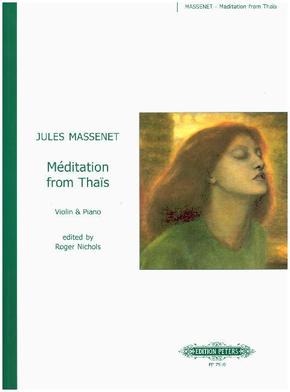Méditation from Thaïs (Arranged for Violin and Piano)
| Verlag | Ed. Peters Publications |
| Auflage | 2001 |
| Seiten | 16 |
| Format | 23,2 x 30,3 x 0,4 cm |
| Instrumental Music | |
| Gewicht | 92 g |
| ISBN-13 | 9790577081335 |
| Bestell-Nr | 64882598BA |
This arrangement for violin and piano of the famous Méditation from Massenet's opera Thaïs from Edition Peters contains separate violin and piano parts and has been arranged and edited by Roger Nichols. One of the world's foremost authorities on the music of France, Roger Nichols has published and broadcast extensively on the music of composers such as Ravel, Satie, Debussy, Chabrier and Berlioz. In 2006 he was appointed chevalier de la Légion d'honneur for his services to French music.Thaïs, Massenet's tenth completed opera, had its première at the Paris Opéra on 16 March 1894 with the American soprano Sibyl Sanderson in the title role. The libretto by Louis Gallet was based on Anatole France's novel of the same name, serialized in the Revue des deux mondes in 1889 and published in book form the following year.The story tells of the conversion to Christianity of the courtesan Thaïs by the holy man Athanael, and his parallel but opposite conversion to a life dominated b y lust for her. The "Méditation" for solo violin and orchestra, joining the two scenes of Act II, describes the beginning of Thaïs's conversion. The work was not received well initially; by 1897, when Sanderson retired, it had reached only its fourteenth performance. But the "Méditation" was an instant success with violinists, and its religious association also encouraged church organists to play it at Mass during the Communion. Even Pope Pius X's motu proprio of 1903, specifically demanding that the music heard in church should "not include reminiscences of those employed in the opera house", could not prevail against it.
Méditation aus Thaïs (Bearbeitung für Violine und Klavier)
Das bei weitem berühmteste Stück des französischen Komponisten Jules Massenet, Méditation, stammt aus der Oper Thaïs, führte durch dessen Beliebtheit die Oper und auch Massenet zu gro�em Erfolg. In der Geschichte symbolisiert diese Melodie die Bekehrung der Hauptfigur Thaïs zum Ch ristentum, doch ihre Melodramatik wirkt auch abseits der Bühne. Oft wird das Stück als Zugabe genutzt, oder im Gottesdienst, mit Verweis auf den Bezug zum Christentum in Thaïs. Die Meditation gibt dem Spieler eine relativ simple Basis, um in der Interpretation höchste Gefühle auszudrücken.

